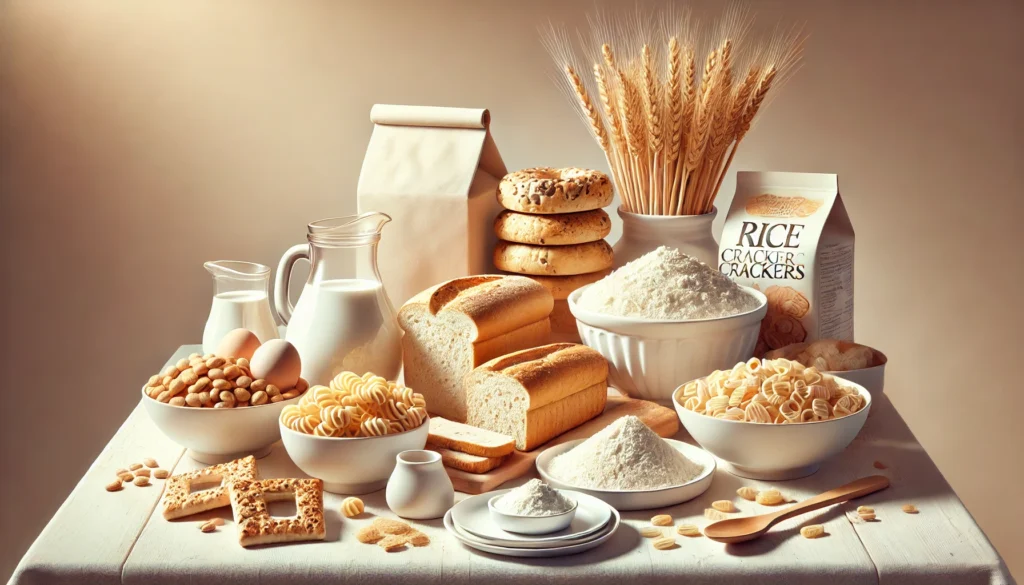One often-overlooked contributor to brain fog is diet. Certain foods have been found to exacerbate symptoms, making it crucial to understand what to avoid to promote clearer thinking and better cognitive health. In this article, we’ll delve into the specific foods that can worsen brain fog symptoms and explore strategies to manage your diet for optimal brain function.
You may also like: Top Foods to Enhance Your Memory
Understanding Brain Fog: A Brief Overview
Before we explore the foods that can worsen brain fog, it’s important to understand what brain fog entails. Brain fog can manifest as difficulty concentrating, forgetfulness, mental fatigue, and slow thinking. These symptoms can be caused by stress, lack of sleep, hormonal changes, or other health conditions such as autoimmune disorders or depression.
Causes and Triggers of Brain Fog
Brain fog can be triggered by a multitude of factors. Stress is a significant contributor, as it can lead to hormonal imbalances affecting the brain’s ability to process information efficiently. Similarly, lack of sleep can hinder the brain’s ability to rejuvenate and repair, resulting in cognitive sluggishness. Autoimmune disorders and depression further complicate the picture, as they can inflame brain tissue or alter brain chemistry, exacerbating foggy thinking.
Impact on Daily Life
The impact of brain fog on daily life can be profound. It can interfere with work performance, making it difficult to focus on tasks or recall important information. In personal life, it can affect relationships, as communication becomes challenging and misunderstandings more frequent. Understanding these impacts is crucial for recognizing the need to address brain fog proactively.
The Role of Diet
Diet plays a pivotal role in the onset and management of brain fog. While other factors might be less controllable, dietary choices are within an individual’s power to modify. By identifying and eliminating foods that trigger brain fog, individuals can enhance their cognitive clarity. Conversely, incorporating brain-healthy foods can help mitigate symptoms and promote better mental acuity.

Foods That Cause Brain Fog
Sugary Foods and Beverages
Sugar is a common ingredient in many processed foods and beverages. While it provides a quick energy boost, it can also lead to a rapid decline in energy levels, often referred to as a “sugar crash”. This fluctuation can exacerbate feelings of brain fog. High sugar intake has been associated with impaired cognitive function and memory.
The Science Behind Sugar’s Effects
The consumption of high-sugar foods causes blood glucose levels to spike, followed by a sharp drop as insulin works to clear the sugar from the bloodstream. This roller-coaster effect can leave you feeling mentally drained and unfocused. Studies have shown that excessive sugar intake can impair memory and reduce overall cognitive performance, making it a key dietary culprit in brain fog.
Hidden Sugars in Everyday Foods
Many people consume more sugar than they realize due to its prevalence in processed foods. Even foods that don’t taste particularly sweet, like bread and pasta sauces, can contain significant amounts of added sugar. Reading labels carefully and being mindful of sugar content in seemingly healthy foods is essential for those looking to reduce brain fog.
Strategies to Cut Down on Sugar
Reducing sugar intake requires a conscious effort to choose whole, unprocessed foods over packaged options. Replacing sugary snacks with fruits or nuts can satisfy cravings without the negative cognitive effects. Gradually reducing sugar consumption helps in recalibrating the palate, making natural sweetness more satisfying over time.
Refined Carbohydrates
Refined carbohydrates, such as white bread, pastries, and pasta, have a similar effect to sugar. They are quickly broken down into glucose, causing a spike in blood sugar levels followed by a sharp drop. This roller-coaster effect can lead to mental fatigue and decreased cognitive performance.
The Rapid Breakdown of Refined Carbs
Refined carbohydrates are stripped of their fiber and nutrients, causing them to be digested rapidly. This quick digestion results in glucose surges that can destabilize energy levels and exacerbate brain fog. The lack of fiber means there’s nothing to slow down the absorption of glucose, unlike whole grains which provide a steady energy release.
Common Sources and Alternatives
Common sources of refined carbohydrates include white rice, white bread, and many breakfast cereals. Opting for whole grain alternatives like brown rice, whole wheat bread, and oats can provide more stable energy levels and support better cognitive function. Whole grains contain fiber, which moderates the release of glucose into the bloodstream.
Benefits of Whole Grains
Whole grains not only support better energy management but also provide essential nutrients like B vitamins and magnesium, which are vital for brain health. By maintaining consistent blood sugar levels, whole grains help in reducing the mental fatigue associated with brain fog. Incorporating them into meals can improve focus and cognitive endurance.
Processed Foods
Processed foods often contain artificial additives, preservatives, and unhealthy fats that can contribute to brain fog. These ingredients may lead to inflammation in the body, including the brain, which can impair cognitive function.

The Hidden Dangers in Processed Foods
Processed foods are engineered for long shelf lives, often at the expense of nutritional value. They typically contain high levels of sodium, unhealthy fats, and preservatives that can promote inflammation. This inflammation can affect brain health, making it harder to concentrate and process information.
Identifying Processed Foods
Processed foods are not limited to fast food or snacks; they can include canned goods, frozen meals, and even some packaged “health” foods. Reading ingredient lists and choosing products with fewer additives can help reduce the intake of inflammatory substances. Preparing meals at home with fresh ingredients is one of the best ways to avoid processed food pitfalls.
Strategies for Reducing Processed Food Intake
Transitioning away from processed foods involves embracing a diet rich in whole, natural foods. Planning meals ahead and cooking at home can significantly cut down on processed food consumption. Exploring different cuisines and recipes can make this transition enjoyable and sustainable.
Aspartame and Artificial Sweeteners
While marketed as a healthier alternative to sugar, artificial sweeteners like aspartame have been linked to neurotoxic effects. Some studies suggest that they can disrupt neurotransmitter function, leading to symptoms of brain fog.
Understanding Neurotoxic Effects
Aspartame and other artificial sweeteners can cross the blood-brain barrier and interfere with neurotransmitter production and function. This interference can lead to symptoms of brain fog, as the brain struggles to communicate effectively. Some individuals may experience heightened sensitivity to these sweeteners, exacerbating cognitive difficulties.
Common Products Containing Artificial Sweeteners
Diet sodas, sugar-free candies, and many low-calorie or “diet” foods often contain artificial sweeteners. These products are marketed for their weight management benefits but may come at the cost of cognitive clarity. Choosing natural sweeteners like honey or maple syrup can provide a safer alternative for sweetening foods and beverages.
Safe Alternatives to Artificial Sweeteners
Natural sweeteners such as stevia, monk fruit, and erythritol offer sweetness without the neurotoxic risks associated with artificial options. These alternatives are derived from natural sources and can be used in moderation to satisfy sweet cravings. Experimenting with different sweeteners can help find a balance that maintains both health and taste preferences.
Alcohol
Alcohol consumption can interfere with neurotransmitter balance and disrupt sleep, both of which are vital for cognitive clarity. Chronic alcohol use has been associated with cognitive decline and memory issues.
The Impact of Alcohol on Brain Chemistry
Alcohol acts as a depressant, affecting the central nervous system and altering neurotransmitter levels. This alteration can disrupt communication between brain cells, leading to impaired cognitive function and memory. Even moderate alcohol consumption can have lingering effects on mental clarity the following day.
Sleep Disruption and Brain Fog
Alcohol is known to interfere with REM sleep, the restorative phase crucial for cognitive processing and memory consolidation. Poor sleep quality can exacerbate brain fog symptoms, making it difficult to concentrate and process information effectively. Limiting alcohol intake, especially in the hours leading up to bedtime, can help improve sleep quality and cognitive clarity.
Strategies for Reducing Alcohol Consumption
Cutting back on alcohol can be challenging but rewarding for cognitive health. Setting specific goals, such as limiting drinks to weekends or special occasions, can help manage intake. Exploring non-alcoholic beverages and mocktails can provide enjoyable alternatives without the negative cognitive effects.
Gluten
For individuals with gluten sensitivities or celiac disease, gluten can cause inflammation that affects brain function. Even those without these conditions may experience brain fog as a result of gluten consumption.
Understanding Gluten Sensitivities
Gluten, a protein found in wheat, barley, and rye, can trigger an immune response in susceptible individuals. This response can lead to inflammation not just in the gut, but also in the brain, affecting cognitive function. Recognizing symptoms of gluten sensitivity is crucial for those experiencing unexplained brain fog.
Identifying Gluten in Foods
Gluten is present in many common foods, including bread, pasta, and baked goods. It can also be found in less obvious products like sauces and soups. Reading labels and choosing gluten-free alternatives can help manage symptoms for those sensitive to gluten.
Benefits of a Gluten-Free Diet
A gluten-free diet can reduce inflammation and improve cognitive clarity for individuals with gluten sensitivities. Many people report enhanced focus and memory after eliminating gluten from their diets. However, it’s essential to ensure that a gluten-free diet remains balanced and nutritious, incorporating a variety of whole foods.
Foods That Help With Brain Fog
Omega-3 Fatty Acids
Omega-3 fatty acids, found in fish like salmon and mackerel, as well as flaxseeds and walnuts, are known to support brain health. They reduce inflammation and promote better communication between brain cells.
The Science of Omega-3s and Brain Health
Omega-3 fatty acids are integral components of cell membranes in the brain, influencing cell fluidity and communication. They play a key role in reducing inflammation, which can otherwise impair cognitive function. Research has linked omega-3 intake to improved memory and reduced risk of cognitive decline.
Top Sources of Omega-3s
Fish such as salmon, mackerel, and sardines are among the richest sources of omega-3 fatty acids. For those who prefer plant-based options, flaxseeds, chia seeds, and walnuts offer a substantial amount of these essential fats. Incorporating these foods into meals can boost brain health and help alleviate brain fog.
Easy Ways to Incorporate Omega-3s
Incorporating omega-3s into your diet can be simple and delicious. Adding a tablespoon of flaxseeds to your morning smoothie or opting for grilled salmon for dinner are easy ways to boost intake. For those with dietary restrictions, omega-3 supplements can be a practical alternative, though it’s best to consult with a healthcare provider before starting any new supplement regimen.
Antioxidant-Rich Foods
Foods rich in antioxidants, such as berries, green leafy vegetables, and nuts, help protect the brain from oxidative stress, which can exacerbate brain fog. These foods support cognitive function and memory retention.
The Role of Antioxidants in Brain Health
Antioxidants combat oxidative stress by neutralizing free radicals, unstable molecules that can damage cells, including brain cells. This protection is crucial for maintaining cognitive health and preventing the decline associated with aging and environmental stressors. Consuming a variety of antioxidant-rich foods can help sustain mental clarity and focus.
Top Antioxidant Foods to Include
Berries, such as blueberries, strawberries, and blackberries, are packed with antioxidants called flavonoids. Green leafy vegetables like spinach and kale, along with nuts and seeds, also offer a potent antioxidant boost. Incorporating a colorful array of these foods into your diet can provide comprehensive support for brain health.
Creative Ways to Enjoy Antioxidant Foods
Incorporating antioxidant-rich foods into your diet can be both fun and flavorful. Adding berries to yogurt or oatmeal, making smoothies with leafy greens, or snacking on a handful of nuts are easy ways to enjoy these brain-boosting foods. Exploring different recipes can keep your diet varied and enjoyable.
Whole Grains
Whole grains such as quinoa, brown rice, and oats provide a steady release of glucose, ensuring a consistent energy supply to the brain. This can enhance concentration and reduce symptoms of brain fog.
The Importance of Steady Energy Supply
Whole grains are digested more slowly than refined grains, providing a gradual release of glucose into the bloodstream. This steady energy supply supports sustained concentration and mental endurance, essential for combating brain fog. Choosing whole grains over refined options can make a significant difference in cognitive performance.
Diverse Options for Whole Grains
The variety of whole grains available allows for diverse and satisfying meal options. Quinoa, with its high protein content, is excellent for salads and sides. Brown rice can replace white rice in most dishes, while oats make a nutritious base for breakfast. Experimenting with different grains can add texture and flavor to meals while supporting brain health.
Simple Whole Grain Recipes
Incorporating whole grains into your diet can be easy and delicious. Preparing a quinoa salad with vegetables and a light dressing, or enjoying a bowl of oatmeal topped with fruits and nuts, can provide brain-nourishing meals. These recipes are not only nutritious but also versatile, allowing for customization based on personal taste preferences.
Fermented Foods
Fermented foods like yogurt, kimchi, and sauerkraut contain probiotics, which support gut health. A healthy gut microbiome is linked to improved mood and cognitive function.
The Gut-Brain Connection
The gut and brain communicate through the gut-brain axis, a complex network influenced by gut microbiota. Probiotics found in fermented foods help maintain a balanced microbiome, which can positively impact brain health. This connection underscores the importance of gut health in managing brain fog symptoms.
Popular Fermented Foods and Their Benefits
Yogurt, kefir, kimchi, sauerkraut, and miso are popular fermented foods that offer a rich source of probiotics. These foods not only support digestive health but also enhance mood and cognitive clarity. Incorporating a variety of fermented foods into your diet can provide a wide range of beneficial bacteria.
Incorporating Fermented Foods into Meals
Adding fermented foods to your diet doesn’t have to be complicated. Enjoying yogurt with breakfast, adding kimchi to a salad, or using sauerkraut as a condiment are simple ways to include these probiotic-rich foods. Exploring different cuisines that emphasize fermentation can also expand your culinary horizons.
Adopting a Brain Fog Diet
To minimize brain fog, consider adopting a diet that emphasizes whole, unprocessed foods. The Mediterranean diet, rich in fruits, vegetables, whole grains, and healthy fats, is often recommended for supporting cognitive health.
Practical Tips for Reducing Brain Fog Through Diet
Stay Hydrated
Dehydration can impair cognitive function, so ensure adequate water intake. Drinking plenty of water throughout the day helps maintain concentration and energy levels. Incorporating hydrating foods like cucumbers and watermelons can also support hydration.
Limit Caffeine
While moderate caffeine consumption can enhance alertness, excessive intake can lead to jitters and mental fatigue. Balancing caffeine intake and opting for herbal teas can provide a gentler energy boost without the negative side effects. Being mindful of caffeine consumption, especially in the afternoon, can help maintain cognitive clarity.
Manage Portion Sizes
Overeating can lead to lethargy and exacerbate brain fog symptoms. Practicing portion control and mindful eating can help maintain energy levels and improve focus. Listening to hunger cues and avoiding distractions during meals can enhance this practice.
Consider Supplements
Consult with a healthcare provider about supplements such as B-vitamins, vitamin D, and magnesium, which are crucial for brain health. These nutrients support various cognitive functions and can help mitigate brain fog symptoms. Working with a professional ensures that supplementation is safe and effective.

Conclusion
Brain fog can be a frustrating experience, but understanding its dietary triggers can help you take control. By avoiding foods that exacerbate symptoms and incorporating brain-healthy options, you can enhance cognitive clarity and support overall well-being.
Incorporating these dietary changes, along with maintaining a healthy lifestyle, can provide a clearer, sharper mind. The journey to reducing brain fog begins with mindful eating and informed dietary choices. Empower yourself with the knowledge of how diet influences brain health and take proactive steps towards a more focused and vibrant life.
Further Reading:
5 Foods to Prevent and Combat Brain Fog
Nutritional psychiatry: Your brain on food
Important Note: The information contained in this article is for general informational purposes only, and should not be construed as health or medical advice, nor is it intended to diagnose, prevent, treat, or cure any disease or health condition. Before embarking on any diet, fitness regimen, or program of nutritional supplementation, it is advisable to consult your healthcare professional in order to determine its safety and probable efficacy in terms of your individual state of health.
Regarding Nutritional Supplements Or Other Non-Prescription Health Products: If any nutritional supplements or other non-prescription health products are mentioned in the foregoing article, any claims or statements made about them have not been evaluated by the U.S. Food and Drug Administration, and such nutritional supplements or other health products are not intended to diagnose, treat, cure, or prevent any disease.


